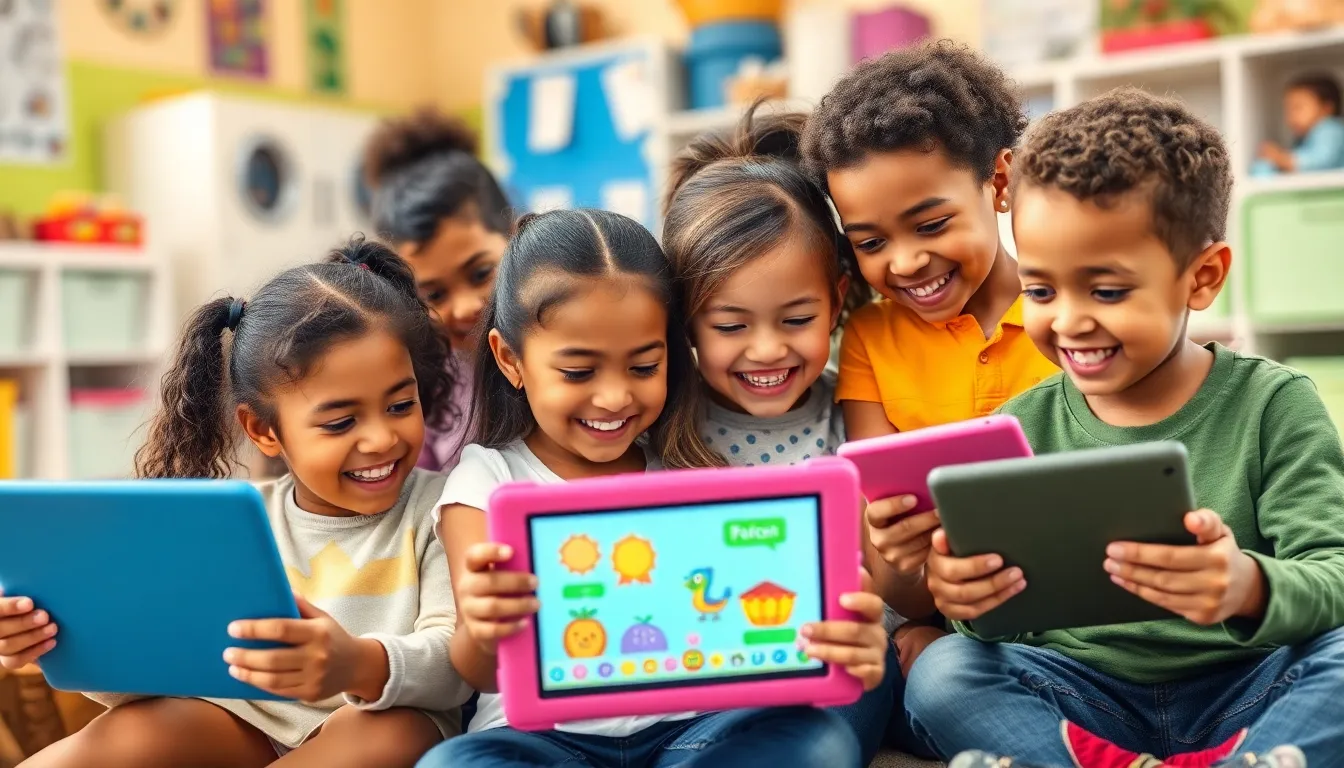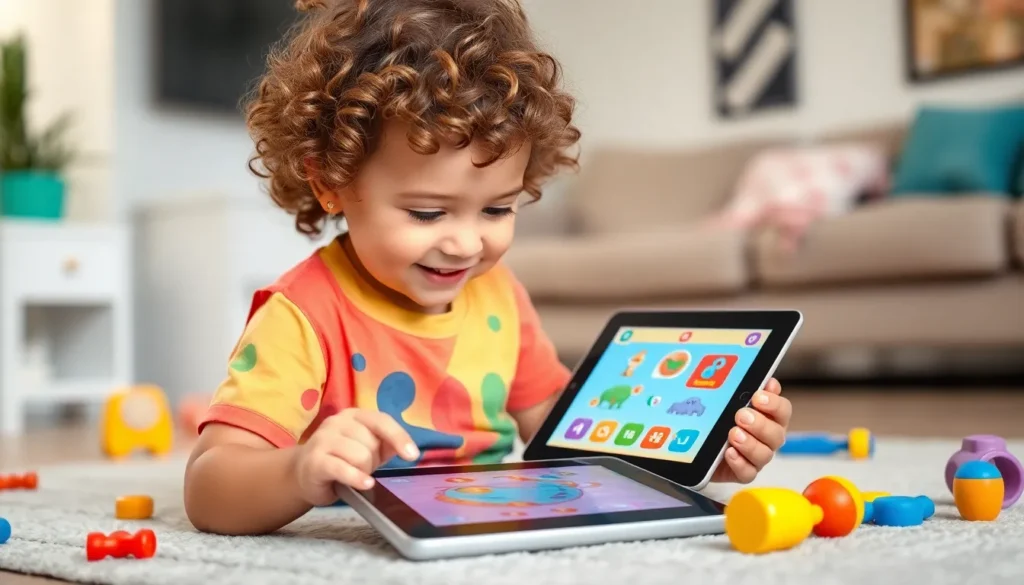Table of Contents
ToggleIn today’s digital age, keeping preschoolers engaged while they learn can feel like herding cats. Enter online learning games—those magical portals where education meets fun! These interactive adventures not only spark curiosity but also turn screen time into brain-boosting playtime.
Overview of Online Learning Games for Preschoolers
Online learning games for preschoolers offer numerous benefits. Engaging activities help develop essential skills, including problem-solving and critical thinking. These games typically feature vibrant graphics, captivating narratives, and interactive components that maintain children’s interest.
Many formats exist, from simple puzzles to elaborate adventure games. Educational content targets various subjects, such as math, literacy, and science, ensuring a well-rounded experience for preschoolers. Games designed for early learners often include parental controls, allowing adults to monitor their child’s play effectively.
Interactive features promote active participation, reinforcing learning through play. Children can explore their creativity in games that involve drawing, building, or storytelling. Multiplayer options foster social interactions, enabling kids to collaborate and learn together.
The accessibility of online platforms allows children to learn anytime and anywhere. Many games can function on various devices, including tablets, smartphones, and computers. This flexibility makes learning both convenient and fun, catering to individual schedules.
Quality online learning games align with preschool curricula, addressing developmental milestones. As a result, they support early childhood education by engaging young minds. Moreover, they often include progress tracking, providing insights into a child’s growth and areas for improvement.
Ultimately, online learning games provide a meaningful way for preschoolers to expand their knowledge while enjoying play. By integrating entertainment and education, these games transform screen time into a valuable experience that fosters lifelong learning habits.
Benefits of Online Learning Games

Online learning games provide significant advantages for preschoolers, enhancing their educational experiences. These games stimulate various areas of development, including cognitive skills and social interactions.
Cognitive Development
Cognitive development occurs as preschoolers engage with online learning games. These games challenge children with puzzles and problem-solving tasks that sharpen critical thinking abilities. They provide stimulating environments where young learners can explore math, literacy, and science concepts. Interactive components keep children attentive, reinforcing their understanding through hands-on participation. Bright graphics and narratives motivate children to engage in learning activities. Tracking progress enables caregivers to identify areas needing improvement and tailor experiences accordingly.
Social Skills Enhancement
Social skills enhancement is another key benefit of online learning games. Multiplayer options allow preschoolers to collaborate and work with peers, fostering teamwork skills. Sharing ideas and strategies promotes important communication abilities among young players. Engaging in games that require cooperation helps children learn about empathy and patience. Online platforms often include chat features or guided interactions, ensuring a safe space for social connection. As preschoolers play together, they build friendships, creating a supportive learning environment that contributes to their overall development.
Popular Online Learning Games for Preschoolers
Engaging online learning games capture preschoolers’ attention while promoting educational development. Several high-quality games stand out in this dynamic landscape.
Game 1: ABCmouse
ABCmouse offers a comprehensive, interactive curriculum designed for children aged 2 to 8 years. This game covers subjects such as reading, math, science, and art through engaging activities. Children navigate various levels and earn tickets for completing tasks, which can be used for fun rewards. The platform’s colorful graphics and cartoons maintain interest, creating a fun learning environment. Progress tracking features keep parents informed about their child’s development. Gamified learning helps preschoolers build a strong foundation in essential skills while enjoying each interaction.
Game 2: Starfall
Starfall emphasizes phonics and reading skills in a playful setting. With a focus on early literacy, preschoolers engage in activities that develop their vocabulary and comprehension. Vibrant animations and catchy songs make learning enjoyable. This game provides interactive stories that captivate children’s imaginations, encouraging them to explore reading independently. Teachers and parents appreciate the structured lessons that align with educational standards. Starfall’s approach nurtures young learners’ confidence while fostering a lifelong love of reading.
Tips for Parents on Choosing Games
Selecting the right online learning game ensures a positive educational experience for preschoolers. Parents should consider several factors to maximize the benefits of these games.
Age Appropriateness
Consider age appropriateness when choosing games for preschoolers. Selecting games specifically designed for their developmental stage keeps children engaged. Explore options that cater to children between the ages of 2 and 5, as many games target specific age ranges. Finding games that use language and themes suitable for this group fosters understanding and retention. Avoid games with overly complex tasks, as these can frustrate young learners. Prioritize games that offer progressive challenges, allowing children to build skills at their own pace, which boosts confidence.
Educational Value
Evaluate the educational value of each game. Selecting games aligned with early childhood education standards promotes effective learning. Look for games that cover foundational subjects such as reading, math, and science, enhancing diverse skill sets. Games featuring interactive components and stimulating graphics capture children’s attention while delivering educational content. Seek options that include problem-solving activities, fostering critical thinking and creativity. Incorporating progress tracking features gives insight into a child’s development, which helps parents understand learning patterns and strengthen support.
Monitoring Screen Time
Monitoring screen time is crucial for preschoolers engaging with online learning games. Parents must establish clear limits to ensure balanced use. Experts recommend that preschoolers spend no more than one hour per day on screens, particularly for educational content. Checking game duration can help families maintain this guideline.
Using parental controls can enhance monitoring effectiveness. Many online learning games offer settings that allow parents to track usage and adjust time limits. These features help maintain a healthy balance between digital play and physical activity.
In addition to setting limits, parents can schedule specific times for online learning. Designating particular hours for screen time can promote routine and structure. Families might consider integrating screen time with other activities, such as reading or outdoor play, fostering a well-rounded approach to learning.
Discussing game choices openly fosters a collaborative environment. Parents can engage preschoolers by asking about their favorite games and what they enjoy. This dialogue encourages children to reflect on their learning experiences and share insights.
Observing children’s reactions during gameplay is also beneficial. Noting their engagement levels can help assess whether the games maintain interest or become monotonous. High levels of frustration may indicate a need for a new game or adjustment in difficulty.
Lastly, promoting offline activities alongside online learning games combats excessive screen time. Encouraging art projects, storytelling, and hands-on games enhances overall development. Balancing the digital with the physical nurtures creativity and critical thinking, ensuring preschoolers thrive in diverse learning environments.
By effectively monitoring screen time, families can maximize the educational benefits of online learning games while supporting healthy development.
Online learning games for preschoolers offer a dynamic approach to early education. By blending fun and learning these games captivate young minds while developing essential skills. Parents can feel confident knowing that many of these platforms provide valuable insights into their child’s progress and align with educational standards.
With features that promote creativity teamwork and critical thinking these games create a supportive environment for children to thrive. By choosing age-appropriate options and monitoring screen time parents can ensure a balanced and enriching experience. Embracing online learning games can foster a love for learning that lasts a lifetime while helping preschoolers build friendships and develop important social skills.




